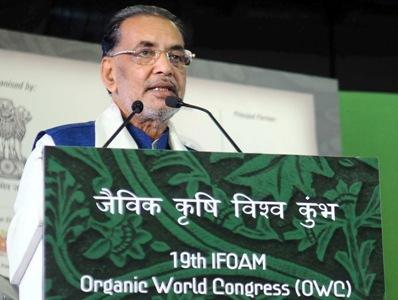NOIDA, 09 November 2017 : India is one of the oldest organic agricultural nations of the world has always promoted an organic method of farming, Indian agriculture minister, Radha Mohan Singh said at the Organic World Congress 2017.
Speaking while inaugurating the Organic World Congress 2017, Singh said that currently, 2.25 million hectares have been brought under organic farming and 360,400 farmers have been benefited by Paramparagat Krishi Vikas Yojana.
Now, the aim is to bring 50,000-hectare area under organic farming in the northeast region. So far 45,863 hectares have been brought under organic farming, 2,406 Farmers Interest Group (FIG) have been created and 44,064 farmers have been linked to the scheme against the target of 2,500 FIG, Singh stressed.
Singh also said that though India is one of the oldest organic agricultural nations of the world and a large part of the country still practices traditional organic farming.
Now, the aim is to bring 50,000-hectare area under organic farming in the northeast region. So far 45,863 hectares have been brought under organic farming, 2,406 Farmers Interest Group (FIG) have been created and 44,064 farmers have been linked to the scheme against the target of 2,500 FIG.
Singh said that in Uttar Pradesh, Paramparagat Krishi Vikas Yojana was launched in 2015-16 and so far 28,750 farmers have been benefited from 28750 acres of land. For the marketing of organic products, the government is allocating Rs.5 lakh per district for the setting up of sales outlet.
Some international scientists call such farming default organic, however, it is important to understand that often farmers, who continue with these methods, are organic farmers by choice. Using their wisdom, they have been treading this path for centuries. They are not happy with chemicals and pesticides and choose not to use them. Therefore, their farming practices cannot be called default in any way, Singh underlined.
Singh said that the Government acknowledges that indiscriminate and excessive use of chemicals during last several decades has posed a question - how long can we continue to do farming like this? The environment and social and economic issues are linked to chemical fertilizer based farming and it needs our attention.
Singh said that Food Security is not an issue anymore in the country, but we still have the challenge of providing healthy and nutritious food to the growing population.
We have become dependent on chemical farming and the use of fertilizers, pesticides, and other chemicals have increased the production but at the same time excessive use of chemicals has led to the production of unhealthy crops. Shri Singh said that if we analyze the adverse effects of indiscriminate use of these chemicals on the environment, we realize a large part of chemical is absorbed by the soil, air, and plants. Spraying of chemicals pollutes far away plants. Also, these chemicals seep into the ground and pollute water sources.
Agriculture minister said the use of chemicals has led to climate change and created ecological imbalance and it is affecting human beings too. For the sake of soil health, sustainable production, and healthy and nutritious food for people, organic farming has become a national and global requirement.
The event, organized by International Federation of Organic Farming Movements (IFOAM) and OAFI, will see the participation of 1,400 representatives from 110 countries, and 2000 Indian delegates.




















